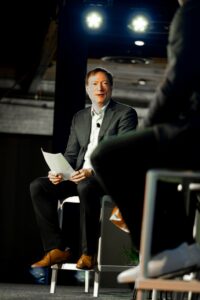By Sara Downey, Thought Leadership, Dell Technologies
The South by Southwest (SXSW) conference and festivals returned to Austin, Texas, in March after two years online. And true to SXSW’s mission to bring together art, music, technology and culture, tech leaders highlighted the non-technical skills critical for technology’s future.
 In a panel sponsored by Dell Technologies, strategic futurist Nancy Giordano, Will Hurd, managing director at Allen & Company, and Amber Allen, chief executive officer at Double A Labs, joined Dell’s Global Chief Technology Officer John Roese to weigh in on the topic of Skilling for a Digital Future.
In a panel sponsored by Dell Technologies, strategic futurist Nancy Giordano, Will Hurd, managing director at Allen & Company, and Amber Allen, chief executive officer at Double A Labs, joined Dell’s Global Chief Technology Officer John Roese to weigh in on the topic of Skilling for a Digital Future.
Roese set the tone of the discussion by pointing out that technology is about people. “Technology without people to build it, use it and experience it isn’t very useful,” he said. “But how do we make sure that the human part of it is actually prepared?”
Giordano advised staying curious about the future: “If we can just calm down about it… [technology] and [worry less], we’ll become more curious,” she said. And that curiosity will open doors to learning vital skills. “It’s not just about the skills,” she added. “It’s really about the way that we’re approaching things.”
Breakthrough, new research from Dell Technologies, backs her up and highlights businesses’ struggle to break through rigid approaches to technological change. Three quarters (74%) of 10,500 respondents from more than 40 countries report their teams need more people with a love of learning and curiosity, people who can envision the future, and those who learn from mistakes and course-correct.
As essential building blocks for change, we need to foster these attributes and approaches. According to Roese, curiosity also helps people build community in the quest for knowledge. “There are lots of people you can call up, who will gladly talk to you,” he said. The resulting path to learning new skills is “not just about the underlying technology, it’s also about better networks.”
The future doesn’t look anything like the present. It’s expansive, and it’s open. It’s an ecosystem and it’s networked. And it’s not just technical. Don’t be afraid of it. Don’t stay out of the game.
– John Roese, global chief technology officer, Dell Technologies
They stressed the importance of bringing new faces into technical fields. For instance, Roese addressed women and other underrepresented groups in a plea to join the technology workforce. “We want you to be involved,” he said. “There’s just so much work to do, and there’s so much opportunity.”
Vital skills for the digital work world
As for the actual skills needed, Roese named empathy first. Empathy helps technologists work effectively since they frequently have to work together. “A lot of software development tasks are paired,” he said. “You work with someone else. And if you’re highly empathetic, you can work in that environment.”
Technical skills will remain in high demand, Hurd pointed out. He lamented the lack of coding education in schools. “It’s improving, but it’s still not where it needs to be,” he said. “If you’re in high school, and you can get access to data analytics and coding, those are going to serve you for the rest of your life, regardless of industry.”

Even so, Roese affirmed that more than technical skills would be in demand. “Don’t be afraid of a technical space because you assume it only values technology,” he advised. “Yes, there are technical requirements,” he said of jobs at Dell. “There are people who actually write code and understand that. But there are people who sit in roles that don’t write any code. They’re technical enough to understand and appreciate it, but their real skill is user stories, understanding how to contextualize what we’re going to do.”
Because of the changing nature of technology, Roese advises hiring managers to look beyond the usual suspects. “These days, you can’t assume that the only person who can do the job is the one that has the Ph.D. or the experience doing it in the old world.” That’s why Dell is actively recruiting from community colleges. “We’re in a war for talent,” he said. “We need bright people that can adapt. I care about aptitude and the ability to participate.”
Dell’s focus on broadening its recruitment efforts shows success in technology-related fields is less about where you’ve come from—your current bag of tricks—but how quickly you’re able to learn and adapt.
Advice for recruits
Roese wrapped up the panel by asking each panelist what advice they’d give a young person preparing for the future workforce.
Hurd advised letting curiosity lead you: “If you find something that interests you, be curious and figure out why,” he said.
Giordano advised letting go of fear: “I meet a lot of people who are really afraid of the future,” she said. “And I encourage them to turn that fear into curiosity.” Hand in hand with curiosity, compassion is equally valuable, she said: “Have a lot of compassion for yourself and compassion for others. It is a fast-moving time, and we’re not always going to get it right.”
Allen encouraged dismissing the supposed divide between techies and non-techies because of the broad range of skills needed to build the future of technology. “That old concept of you are either very techie or you’re very creative is so false,” she said.
Roese agreed: “The future doesn’t look anything like the present,” he said. “It’s expansive, and it’s open. It’s an ecosystem and it’s networked. And it’s not just technical. Don’t be afraid of it. Don’t stay out of the game.”

